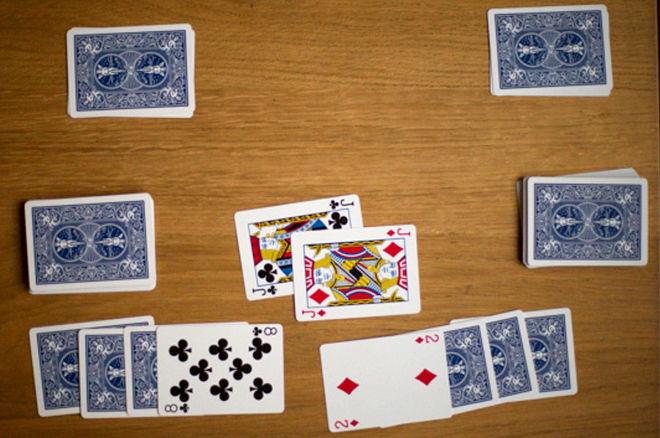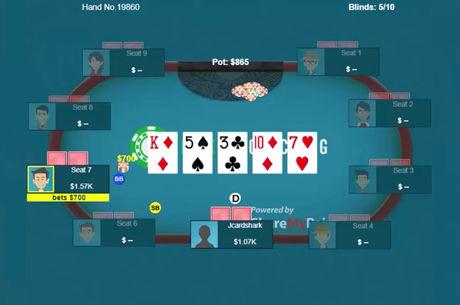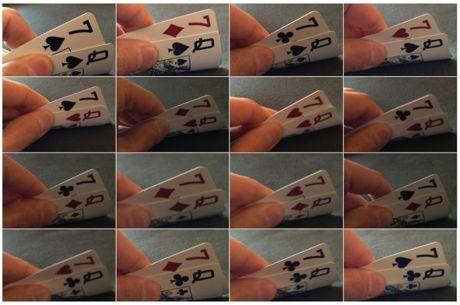Teaching Poker to the Complete Newbie

Nearly everyone learns and teaches poker in the same way. I think there's a better way. Decide for yourself.
I learned poker �� and I suspect you probably did, too �� by starting with the poker hands. That is, we begin on the poker path by first learning what beats what.
We teach new players that a pair beats no pair, two pair beats a pair, three of a kind beats two pair, and so on all the way up to a royal flush. We might print out the hands for easy reference while they are playing their first game.
Then we typically teach how the cards are dealt (differently for different variations of the game). After that we teach how to ante, what the blinds are, and other essentials of betting, checking, raising, calling, and folding.
This method surely works. Poker is not that hard of a game to teach, and newcomers generally learn how to play this way well enough, often within just 10-15 minutes or so.
But I think this way of teaching poker is wrong! Or at least it obscures what is the most important aspect of the game.
Consider for a moment what the essence of poker is. What makes it different from all the other card games? It's the betting, isn't it?
Bridge, gin rummy, Go Fish, hearts �� these are all card games with a strategy that involves the playing of the cards. Though you might play these games for money, they are not about the money, nor is money an fundamental part of the game. In these games, any money wagered is incidental to the correct strategy.
By contrast, poker is a betting game played with cards. In fact, if you think about it, the cards themselves are really incidental to the game, which is essentially a contest that is focused on the money.
Even if you play poker only for chips (as I did when I was a child), the game still is all about the money substitute �� the accumulation of chips. Take away the chips and the money, and poker is really no game at all.
The way we teach poker should reflect that. I say start with the betting, not the hand rankings. Yes, start with the betting even for the very young and completely inexperienced.
Here's what I do.
Set aside the five-card game of poker initially. Instead teach one-card poker. You can call it "poker war," because it's really just the game of "War" played for money.
You remember War, don't you? It was probably the first card game you learned. I was taught it when I was five. It's absolutely the simplest card game there is.
Take a deck and split it in half. Let your opponent pick one half, and you take the other. You each turn over a card, and the high card wins both cards. Turn over the next card, and the high card wins both cards. And so on. That's pretty much it.
If you both turn over cards of equal rank, you deal three more cards to each player and then turn over the fourth, and the high card wins all of the cards. You keep this up until one player has all the cards. Pretty simple.
With "poker war," you start the same way. You each get half the deck, but you also each get an equal stack of chips. Before you turn over a card, one player puts in one chip and the other player puts in two chips.
You then follow the same rules of betting as in no-limit hold'em. You may call or fold or raise �� as little as two chips or as much as you have in your stack. If you want you can also teach the betting as it is in stud games or limit games, with antes and bets of fixed amounts.
The key is that you are teaching the betting first, in this case with the players betting on a single card. If there's a showdown, the high card wins. If a player folds and there's no showdown, the last aggressor who wasn't called wins. If there's a tie you split the pot. You start with two players and you expand it to as many players as are learning.
Once players understand the basic rules of betting, you explain and demonstrate basic strategy. You explain what a tight strategy is, and you give some examples by showing how one might decide to only bet with an ace. You explain the limitations of that strategy, telling how it would soon be detected by an opponent who would then refuse to call any bet you made, but who would bet every hand to win the antes.
You would then demonstrate bluffing and how someone might win some pots without the strongest hand simply by betting strongly and getting his opponent to fold his hand �� even to fold a better hand. You'd then discuss the problems of bluffing too much and how opponents would learn to call your hand even when they weren't very strong.
You could then demonstrate a loose-aggressive strategy, a wild strategy, a calling station strategy, and so on. New players would first learn to understand betting strategies without thinking about the more complicated five-card hands and the resulting situations that arise when you are considering cards to come.
Only after the new players played "poker war" for a while and began to understand betting would you introduce the complexity of a five-card hand and the dealing of a game that presents the hand in stages with betting rounds in between. In this way they would understand the hands in the context of the betting, helping them grasp the importance of betting first rather than initially focusing on the absolute strength of their hand.
Then you'd teach them how the five-card hand would be assembled. For example, if the game is hold'em, you'd explain the two hole cards, the flop, the turn, and the river, and how a five-card hand is made from the best available among the seven total. First betting, then hands, and then dealing. That's the order in which I teach new players how to play poker.
I have never known anyone who couldn't eventually figure out the ranking of the hands in poker. It is not hard even for the slowest among us. But I have known many poker players �� even relatively smart ones �� who get stuck on thinking far too much about the absolute value of their cards and fail to recognize the essential betting truth that winning at poker depends more on how you bet your hand than what that hand actually is.
That lesson �� the absolute importance of the betting that surrounds the cards �� is much more easily grasped, I have found, when teaching new players first about the betting of poker rather than the hand rankings.
Maybe you disagree. Now you have a different method to try out so you can see for yourself.
Ashley Adams has been playing poker for 50 years and writing about it since 2000. He is the author of hundreds of articles and two books, Winning 7-Card Stud (Kensington 2003) and Winning No-Limit Hold'em (Lighthouse 2012). He is also the host of poker radio show House of Cards. See www.houseofcardsradio.com for broadcast times, stations, and podcasts.
Photo: Not Merely Living.









